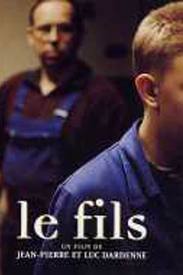
LE FILS (THE SON)
Belgium, 2002, 103 minutes, Colour.
Olivier Gourmet, Morgan Marinne.
Directed by Jean- Pierre Dardenne and Luc Dardenne.
The Dardennes brothers won the Cannes Palme D'Or in 1999 for their simple and moving film, Rosetta. The Son is even more moving and impressive. At first, one wonders. Who is Olivier, this master carpenter that the hand-held camera incessantly follows? Why are we examining his movements and his work so closely? Gradually, the film reveals more and more about Olivier, his past life and his ex-wife, the death of his son, and his training teenagers released from custody. What we are offered by the Dardennes is a portrait of a good man, in fact, an extraordinarily good man whose values are tested to the limit and who shows that the Gospel injunctions about forgiveness are more possible than we would realise.
1. The work of the Dardennes brothers, their social concern, their minimalist cinema style? Combining to produce a humane and insightful film about workers and about the human condition?
2. The atmosphere of the Belgian city, the workplaces, the homes, the countryside? The lack of musical score, the reliance on ordinary sounds, especially in the carpentry workshop?
3. The title and the focus on which son: Olivier's dead son, his ex-wife's pregnancy, Francis? The film really being about the father? Father-son relationships, broken, being built? The role of parents and guardians?
4. The camera following Olivier all the day, at work, in the car, eating, in the offices? It continually being behind him, the audience literally following him and his life? The psychological effect of the audience in understanding him and wanting to understand more?
5. The portrait of Olivier: his age, skills, at work, the detail of his woodwork? His refusing Francis a place in the carpentry shop? Discussions with Katherine at the office, sending Francis to welding, changing his mind? The other apprentices in the group and his training them, the detail of the training, the perfect accuracy of his woodwork? Training them to lift and balance the planks, go up ladders? Francis failing? Trying again?
6. Magali and her visiting Olivier at work, his questioning her, it being Wednesday and her day off, announcing her pregnancy, happy at being pregnant? His offhandedness? His visiting her at the gas station and congratulating her? Her following Olivier, asking him about Francis? His denying it and then agreeing? Her desperate question as to why he was helping Francis? The grief and pain of the loss of her child?
7. Olivier and his following Francis, changing him from welding, seeing him asleep in the changing room, going to his room, giving him lifts, eating with him? Proposing the Saturday trip, in the car, getting him to pay for his food? Francis asking him to be guardian, the reasons for this, the relationship between the two, wanting to call him Olivier? The discussion about his crime, the theft of the radio, getting him to admit to strangling the boy? His attitude towards Francis and listening to him? Getting him to work, consulting the catalogue about the woods? The truth, Francis afraid and Olivier chasing him around the warehouse? Their wrestling together? The what if Olivier had wanted to punish him? Gradually continuing with the work? Olivier finding that he could forgive Francis, that Francis could take his dead son's place? The future?
8. Magali, her background, grief, the visit, her pregnancy, hatred of Francis?
9. Francis and his appearing at the centre, his own appearance, blank, yet eager and intelligent? Confined at the age of 11, his crimes, especially the killing? His initial reaction only that it had taken five years of being locked up? In the detention centre, released, champion at soccer games? As an apprentice, wanting to do woodwork, skills, learning, not able to read or write so well, good at calculating, amazed at Olivier's ability to estimate distances? The jobs, the training, the tools and measurement, following Olivier, respectful of him? The day out, eating, playing the game, talking? His not realising the consequences for others of the killing? Admitting the truth, his fear, running from Olivier? Their fight? Wrestling, his finally picking up the plank and wanting to be with Olivier?
10. The ordinariness of the people, the centre and Olivier being a person who wanted to help people rather than go into business with his brother? A generous person? The values that he stood for? The values of humanity and forgiveness that the film stands for?